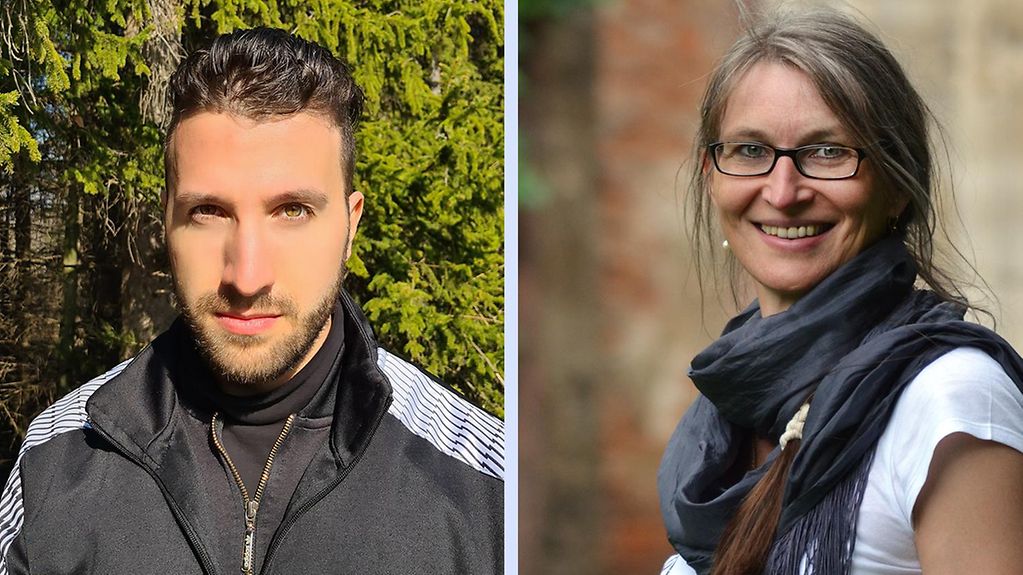Europe Talks
Thousands of people who are interested in politics from all parts of Europe took part in Europe Talks, a project that brings together two people with different political views from different European countries. Gabi Kremeskötter from Germany and Viktor Bonev from Bulgaria were one of the tandem pairs.
4 min reading time

Viktor Bonev from Bulgaria and Gabi Kremeskötter from Germany discussed solidarity during the COVID-19 pandemic
Photo: Bonev (l.) / Carlotta Ostmann (r.)
Gabi Kremeskötter and Viktor Bonev could scarcely be more different. Gabi Kremeskötter, a 54-year-old mother of two, works on the technical side of a company producing stainless steel tanks for the wine industry. She lives in Traben-Trarbach, a small town near Trier. In her free time she is an author, editor and lecturer in creative writing. Viktor Bonev, aged 27, comes from Sofia. He works as a software development, enjoys spending time outside in the countryside and thrives on contacts with other people.
A date for a lively discussion
They are two of the thousands of Europeans who met on 13 December for Europe Talks, an online discussion. Europe Talks was the brainchild of ZEIT ONLINE with media partners in 15 European countries. The project is also assisted by the German Federal Foreign Office.
It revolved around the issue that is the greatest concern for everyone in Europe – the COVID-19 pandemic. Interested individuals had to answer the same seven yes/no questions, e.g. Should face masks be mandatory in all public places in Europe? Should schools remain open throughout the pandemic? Should the first priority always be to protect people from COVID-19, even if the economy suffers as a result? One question dealt with migration and one with climate action.
Algorithm matched people up
An algorithm then matched up two people who had answered quite differently. Like Gabi Kremeskötter and Viktor Bonev. “I was curious and looked forward to the meeting,” said the 54-year-old. “I found it particularly interesting to be paired with somebody from Bulgaria because at work I have contacts every day with Bulgaria.” Viktor Bonev, by contrast, had no particular expectations. “When I applied, my social contacts were very much reduced because of the self-isolation regulations. I was happy to have any meaningful conversation that was possible.”
Solidarity in the crisis
The contact restrictions during the pandemic were then in fact the overriding topic of their conversation. In particular they discussed whether strict contact restrictions are actually necessary. Gabi Kremeskötter has fewer problems with the restrictions than Viktor Bonev. Even before COVID-19 she led a relatively quiet life, since she usually works from home. She had the impression that the restrictions were not so easy for her younger discussion partner.
Although the German was more in favour of a hard lockdown, their views converged in the course of their discussion, Viktor Bonev tells us. “At the end we both felt that our politicians should have taken a completely different course of action from the start,” he says. The elderly and the sick should never have been left alone. They needed more support from the state. In his opinion, support focused too much on the economy and not enough on the people. “The first support, irrespective of the country, should not go to businesses, especially major businesses.”
Gabi Kremeskötter tells us they quickly agreed that we need solidarity in any case to protect vulnerable people. “Even if that means significant restrictions on a personal level.”
Positive verdict
Gabi Kremeskötter and Viktor Bonev spoke for 30 minutes by Skype. Both of them gave their conversation a thumbs up – it was a good, lively discussion. “I think it is important to talk. Especially when different views collide it is very interesting to look at where the other person comes from and at their life,” says Gabi Kremeskötter. That fosters understanding and tolerance for the other person.
And what would they hope for in Europe? Viktor Bonev would have liked Europe to be more united in the crisis. Member states used to act more in concert in the face of crises, he says. The individual countries were left alone with their problems during the pandemic. In future he would thus like to see a more united, more transparent and more financially responsible Europe. “A Europe that looks after its future children and families.” Gabi Kremeskötter finds the cultural diversity of our societies in Europe “wonderful”. We can never do enough to promote mutual respect and understanding for our differences, she says.
The first Europe Talks was held in 2019; this was the second event of the sort. More than 12,000 participants from 34 European states met on 13 December 2020 for a one-on-one conversation. Because of the pandemic, the event was held online, where the pairs discussed issues that are important for all Europeans. The event was initiated by ZEIT ONLINE and is supported by the German Federal Foreign Office and other bodies. This year, Europe Talks will be held on 5 December. Find out more here.